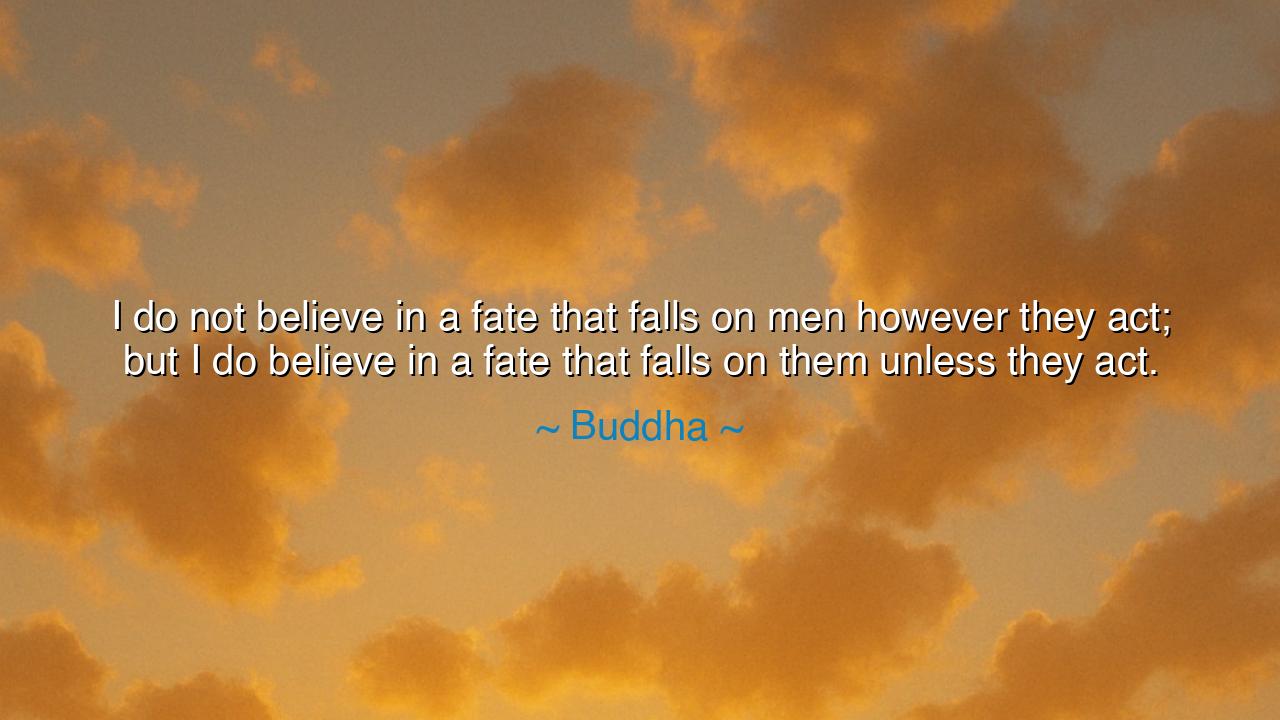
I do not believe in a fate that falls on men however they act;
I do not believe in a fate that falls on men however they act; but I do believe in a fate that falls on them unless they act.






The saying, “I do not believe in a fate that falls on men however they act; but I do believe in a fate that falls on them unless they act,” attributed to the Blessed Buddha, is a lamp for those who wander in the mists of life. It speaks not of chains forged by the heavens, nor of an unyielding destiny written in the stars, but of the silent doom that comes to the man who sits idle while the river of time sweeps by. Fate is not a tyrant that binds every soul to misery, nor a merciless decree that no effort can escape. Rather, it is the shadow that grows when the spirit fails to rise, when the hands refuse to toil, and when the heart cowers before trial.
In this teaching lies a mystery both grave and luminous. If a man surrenders all will, saying, “What shall come, shall come, and I need not strive,” then truly he invites fate to smother him. For the world is a field where seeds are cast, and only those who till, water, and tend may reap the golden harvest. The Buddha’s wisdom reminds us: the gods may not decree our ruin, yet ruin awaits those who make no stand against the storms of existence. Thus, inaction is the true shackle, and action is the liberator.
Consider the tale of the city of Athens when the Persian host came like a dark sea against the Hellenes. The citizens might have bowed, declaring, “It is our fate to be conquered.” Yet Themistocles, wise among men, stirred their courage. They took to their ships, they fought at Salamis, and the tide of empire was turned back upon itself. Here we see the living proof of the Buddha’s words: fate does not fall upon men however they act, but it crushes them if they remain still. By their action, the Athenians forged a future free from chains. By their will, destiny was transformed.
So too in the lives of humbler men. The farmer who kneels before his barren soil and mutters, “It is my fate to starve,” will indeed starve, not because the heavens decree it, but because he failed to plow and sow. Yet another farmer, facing the same earth, rises each dawn, breaks the ground, scatters the seed, and tends with patient care. The rains may be scarce, the sun may burn, yet by his labor he gathers a modest but sustaining harvest. Thus, fate bows before effort, and even hardship cannot wholly vanquish him.
This truth is both stern and merciful. Stern, because it places upon each soul the burden of responsibility—no man may forever blame the stars or curse the gods for his condition. Merciful, because it reveals that no destiny is immovable; through courage, toil, and resolve, one may carve a path through the wilderness of chance. The Buddha calls not for blind faith in destiny, but for heroic action, for striving that redeems and uplifts.
O children of tomorrow, remember this: your life is the clay, but your hands must be the potter. If you stand still, the clay hardens shapeless and rough; if you work it, it becomes a vessel of beauty and purpose. The winds of chance may blow, the floods of sorrow may rise, but only the man who acts stands firm like the oak rooted in the storm.
From this teaching, let us draw a lesson for our own days: do not sit idly waiting for opportunity, fortune, or rescue. Rise and labor. Strive in study, in craft, in kindness, in courage. If the path is blocked, carve another; if the night is dark, kindle even the smallest flame. Action, even if small, defeats the creeping fate of despair.
Therefore, walk forth with this command in your heart: do not fear fate, but fear only inaction. For the man who acts boldly, fate becomes his servant; but the man who hesitates, fate becomes his master. This is the wisdom of the ages, carried from the Buddha’s lips like a fire to warm the generations yet unborn.






AAdministratorAdministrator
Welcome, honored guests. Please leave a comment, we will respond soon